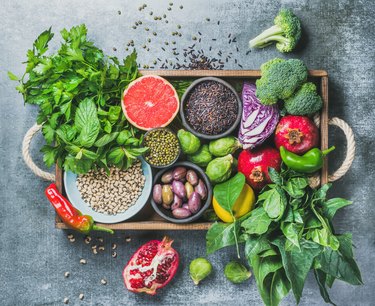
Choosing a vegetarian or vegan diet can provide many benefits, both for your health and for your wallet. A plant-based diet gives you a ton of nutrients for very few calories — and depending on where you live, may also cost much less than buying meat. Simply and suddenly giving up some or all animal products can have unexpected side effects, so make sure you are up on the basics of healthy vegetarian meal planning to ensure that your transition is as fun and healthy as it is effective.
Benefits of Going Vegetarian
Video of the Day
There are many good reasons to become a vegetarian, according to the experts at the Harvard Medical School. Among them are a decreased risk of heart disease, certain cancers and type 2 diabetes. This depends, of course, on whether you eat a lean, nutrient-dense diet or simply give up meat in favor of pizza, snacks and pasta with fatty sauces. Registered dietitian Carrie Woodruff of Utah University Health Care agrees, indicating that vegetarians eating a well-planned diet also have lower risk of renal disease and tend to have a lower body mass index, though fat percentage is a better guideline as to your healthy weight. Before you decide on a meat detox, though, make sure you know what to expect and how to manage any symptoms that may occur.
Video of the Day
Read more: BMI Vs. Body Fat Percentage
Common Meat Withdrawal Symptoms
The most common plant-based diet detox symptoms are caused by a lack of vitamin B-12, according to the health-care professionals at Rush University Medical Center. Vitamin B-12 helps your body produce hemoglobin, a crucial part of red blood cells that carry oxygen through your lungs and into your bloodstream, where the oxygen is used by every part of your body. Some signs of mild vitamin B-12 deficiency are a burning sensation in your tongue or feet, cognitive impairment, constipation and issues with balance.
Low iron levels can also occur when you first start a vegetarian or vegan diet. The first sign of a severe iron deficiency is sudden and noticeable hair loss. Other signs include dizziness, headaches and feeling cold for no apparent reason.
Protein — especially from meat, poultry and fish — takes longer to digest than other nutrients, so it makes you feel full for longer after a meal. Cutting it out may mean that you find yourself hungry more often. Add protein to your meals in the form of nuts and seeds, and plan ahead for lean and healthy snacking.
Read more: Do Certain Foods Raise Hemoglobin Levels?
Getting Complete Nutrition Without Meat
Protein is the most crucial part of your diet, according to Metro. This is because protein is made up of amino acids, which are the building blocks for cells. Animal proteins contain all 10 of the amino acids that your body cannot manufacture, while other foods only contain a partial list. This is why food combining is so important, though you don't need to get all 10 essential amino acids at every meal. Making sure that you consume the complete set in a day works just fine.
The most important nutrients to focus on when attempting a vegan detox, according to the health enthusiasts at Women Working, are vitamin B-12, vitamin D, calcium, iron and zinc. Your best meatless sources for vitamin B-12 are almond milk, coconut milk, soy products, nutritional yeast and supplements. Vitamin D is found mostly in dairy products and seafood such as herring, oysters, salmon, sardines and tuna, which will not help you if you are vegan. In that case, eat plenty of fortified cereals, mushrooms, oatmeal, soy milk and orange juice. The best way to get more iron into your diet is through increasing your intake of both spinach and beans. Vitamin C helps your body absorb iron, so add orange pieces to your spinach salad, or cook your beans with onions and tomatoes.
- Harvard Medical School: Becoming a Vegetarian
- University of Utah: Make a Well-Informed Decision When Becoming a Vegetarian
- Rush University Medical Center: 6 Signs of Nutrient Deficiency
- Metro: What Happens to Your Body When You Stop Eating Meat?
- Women Working: What Happens to the Body When You Stop Eating Meat
Is this an emergency? If you are experiencing serious medical symptoms, please see the National Library of Medicine’s list of signs you need emergency medical attention or call 911.